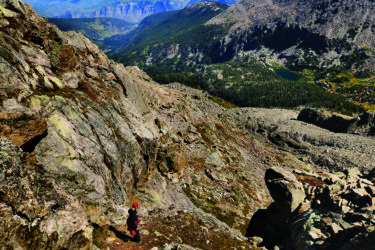The Local newsletter is your free, daily guide to life in Colorado. For locals, by locals.
While growing up on the east side of Denver in the late 1990s, Eeland Stribling loved rolling in the dirt, talking about grass, and watching birds. The activities were encouraged by his grandfather, an accomplished wildlife biologist who named Eeland after the largest African species of antelope. But one thing was often noticeably absent during his early adventures: other people of color.
Stribling decided to further pursue the interests he developed as a kid at Colorado State University, where he obtained a degree in Conservation and Wildlife biology. However, the lack of diversity associated with what was now his chosen profession was once again evident. “I was sitting in class and there was one other Black girl,” Stribling says. “We were talking about all the biodiversity in the world and I remember wishing that there were more people who wanted to learn about this stuff—and more that actually looked like me.”

He knew his interest in ecology stemmed from his environment; most of his childhood friends weren’t exposed to nature or animal-focused activities like he had been. After realizing this, Stribling arrived at his life mission: help introduce people of color to these topics, so they could also have careers in nature and wildlife. “My grandpa always said, ‘You can’t be what you can’t see,’ ” Stribling says. “So, I figured I’d be the thing they see.”
After graduation, he began working for a number of outdoor-focused organizations in the Denver area. Not only has Stribling partnered with Colorado Parks & Wildlife on a number of occasions, but he also collaborates with Brown Folks Fishing, a nationwide network of anglers working to increase accessibility to the sport for people of color. Through this nonprofit, Stribling typically offers two free fly fishing clinics every month, during which he teaches participants how to cast, how to tie flies, and brings loaner gear for everyone to use.
The whole endeavor has a grassroots feel. He posts paper fliers in neighborhoods for advertising, taps into his social media audience (@blacksteveirwin on Instagram), or sends out emails to his manually collected list of people who have expressed interest. “I encourage anyone and everyone to show up,” he says. “We’re all still learning so come, ask questions, and we can all learn together.”
Stribling also works with Lincoln Hills Cares to teach kindergarteners through college students how to fish and identify plants and wildlife tracks. Founded in Denver in 1922, this historically Black enterprise was once the only vacation resort west of the Mississippi River that catered to the African American community. At that time, Black families weren’t allowed at ski resorts and endured segregation at our national parks, so Lincoln Hills was a safe space for them to enjoy Mother Nature. Today, the nonprofit provides access and outdoor opportunities for families whose social, cultural, or economic barriers may prevent them from getting outside.
For Stribling, this is all part of the mission he set out on after college, but now others are joining him in his endeavors and sharing the vision. As an ambassador for Colorado-based Tincup Mountain Whiskey, Stribling is participating in the brand’s upcoming Give it a Shot program. Launching on December 1 in Denver and nine other cities around the country, the project hopes to make the outdoors more accessible for urban dwellers whose lack of information may prohibit them from experiencing new activities. Applications for the program will be open until January 10. Later in the month, 10 Denver applicants and their “adventure partners” will be chosen for the winter session, winning an “Intro to Snowshoeing” day in Rocky Mountain National Park.
As for Stribling? “I’m a warm-weather fisherman,” he says, laughing. “I’m here to fly fish, not ice fish.” Those hoping to learn from Stribling will have to wait until applications for the summer session of the Give it a Shot program open in the late spring.
In the meantime, Stribling, now 26, is hoping to hit the water with his grandfather and his friends for their annual fishing trip. Only now, the student has become the teacher. “I show him all this stuff that I’ve learned and he just has a big smile on his face,” Stribling says. “Man, it makes me feel like I’m doing something right.”








